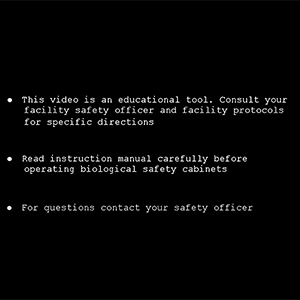Biosafety cabinet
The biological safety cabinet (BSC) is a primary containment barrier for working safely with biological agents (BA). It is a team designed to prevent the release of bioaerosols in the work area and thus protects people and the environment from possible exposure to BA.

The laminar flow designed exclusively to protect the product are not considered BSC. The HEPA filtered air is discharged on the work area but just coming to the part where the operator is located. Therefore, it can be used whenever required environmental conditions sterile and free of particulates. May not be used if handling cell cultures, BA or other materials which may contain
The biosafety cabinet
There are three types, as indicated by the UNE-EN12469 European standard, known as: class I, class II and class III:
Class I
Provides protection to the user and the environment but does not protect the product from possible contamination.
Class II
Providing personal protection, the environment and the product.
Class III
It is completely fenced and offers the maximum protection to the user and to the environment. It is designed to work with high-risk BA.
Doesn’t the UV light in my BSC disinfect everything?
The international standards on laminar flow cabinets (EN12469: 2000, NSF 49) explicitly discourage the use or even the installation of UV lights in BSCs. In order to be effective, UV lamps must be cleaned weekly to remove dirt and dust and should be checked periodically (approximately every 6 months) with a meter to ensure the appropriate intensity of UV light is being emitted for germicidal activity. UV lights must be turned off when the room is occupied to protect eyes and skin from UV exposure.
How often should our biosafety cabinet (BSC) be certified?
BSCs must be certified at the time of installation and annually thereafter. They should also be certified anytime they have been moved and after some repairs (HEPA filter replaced, maintenance to internal parts).
How often should HEPA filter be replaced?
The durability of a HEPA filter will depend on the quality of the filtered air, the time of use and the characteristics of the processes that are carried out and that may affect the air quality or directly the state of the filter.
It is expected that, with the passage of time, the filter will decrease its flow rate, to the point at which it is considered saturated. Statistical studies show an average duration time for HEPA filters of 5 to 7 years. In air environments with very low concentration of particles and procedures with low release of particles, these times can be increased.
The need to replace the HEPA filter is evidenced by the results of the periodic qualification tests that will determine its status. If the filter does not pass the saturation, flow and absence of leak tests, it must be replaced since no type of repair can be done.
Why aren’t Bunsen burners or open flames permitted inside the BSC?
The use of open flames, flammable gases, and flammable liquids inside a BSC:
- Disrupts the air flow, compromising protection of both the worker and the work.
- Causes excessive heat buildup which may damage HEPA filters and/or melt the adhesive holding the filter together, thus compromising the cabinet’s integrity
- Presents a potential fire or explosion hazard. Electrical components such as the BSC fan motor, lights and electrical outlets are not designed to operate in flammable atmospheres, where a flash fire could be ignited by a spark. A majority of BSCs, recirculate 30-70% of the air in the cabinet through a HEPA filter; gas leaking in the cabinet from a faulty connection or burner can quickly build to explosive levels due to this recirculation process.
- Cabinet manufacturers will assume no liability in the event of fire, explosion or worker exposure due to the use of a flammable gas in the cabinet.
Alternatives to Bunsen burners and open flames include:
- Alternative technology such as electric incinerators, glass bead sterilizers
- Disposable loops, spreaders, and other instruments
- Pre-sterilized packs of instruments such as tweezers, scissors and scalpels
If it is deemed absolutely necessary for the work being done, a small alcohol burner containing only enough alcohol for one day’s work, or a touch-plate microburner, providing a flame on demand may be used.




